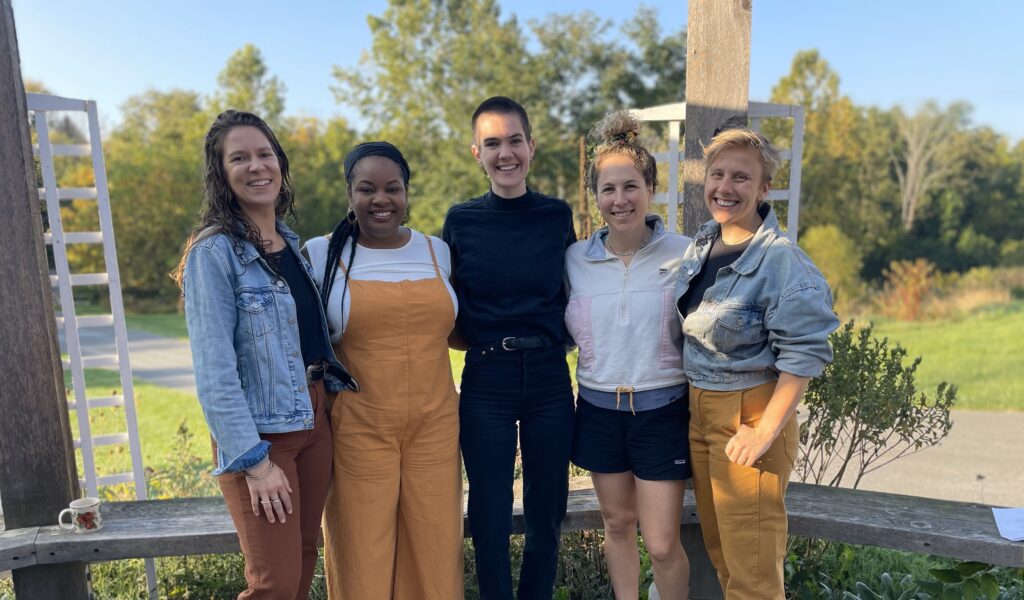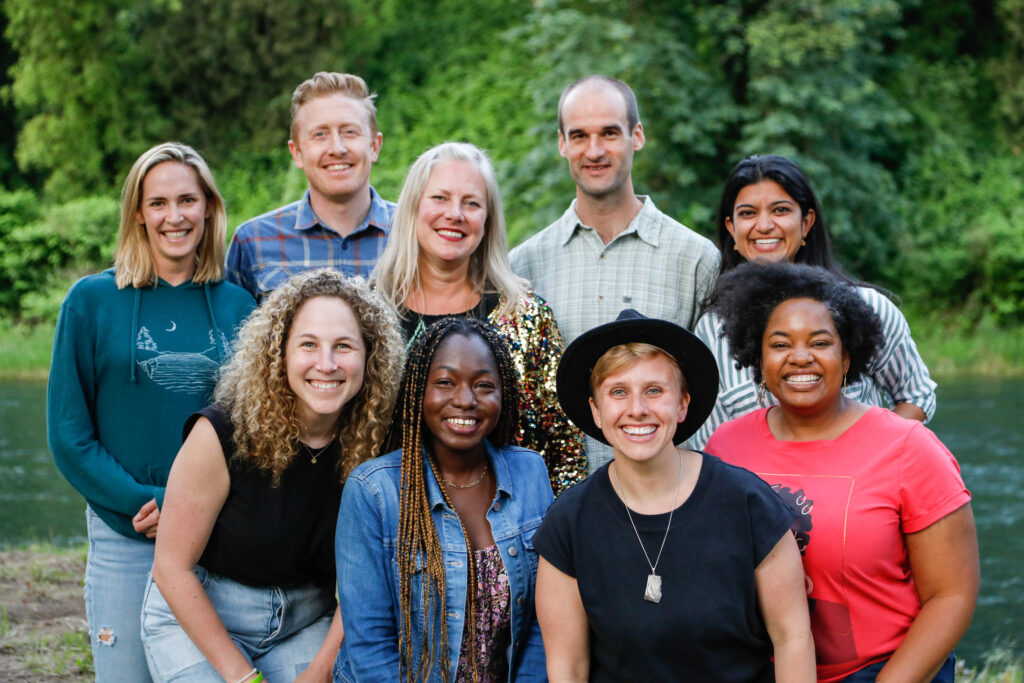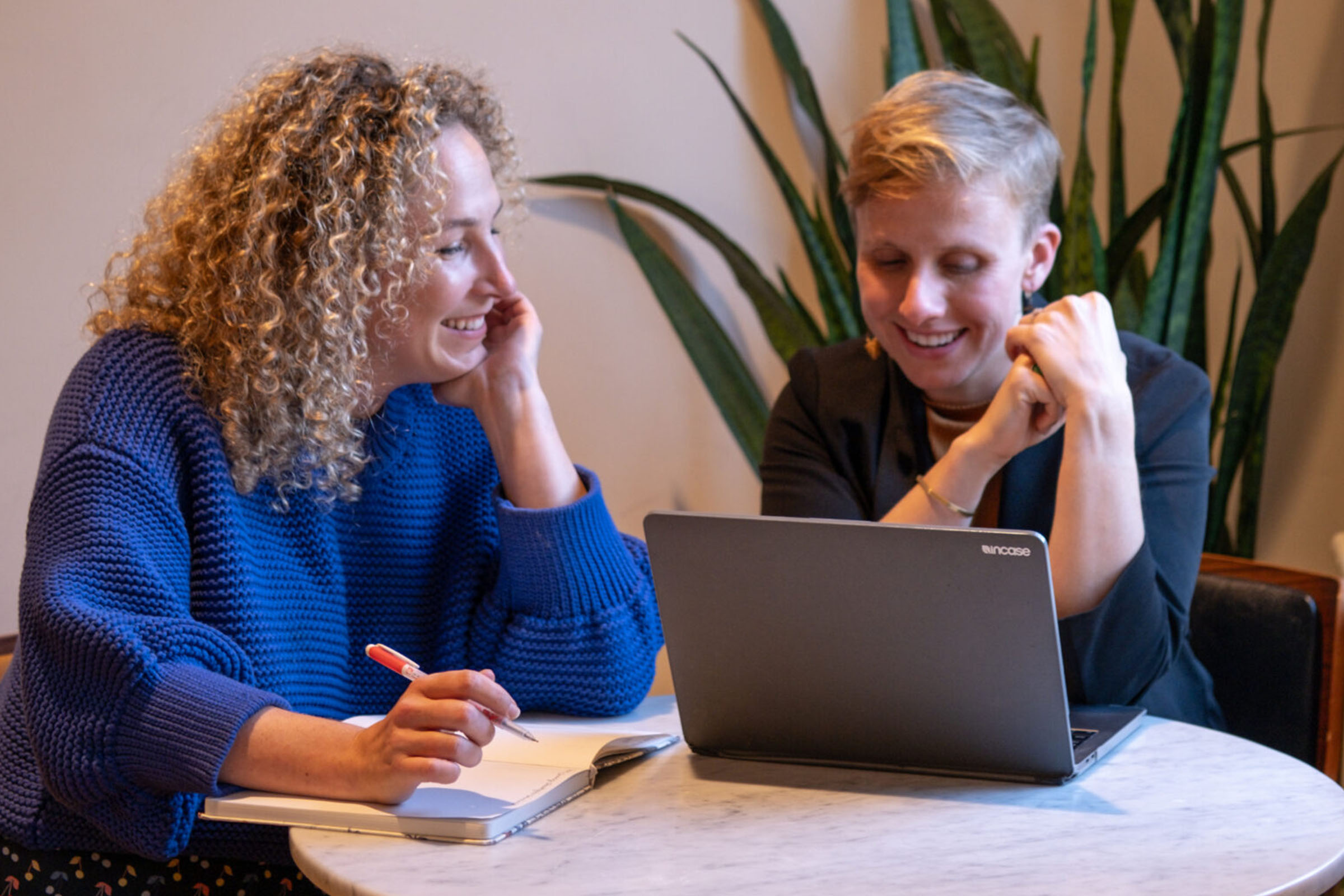November 15, 2023 — After seven years with the Wallace Center, our colleagues, Elizabeth Atwell and Ellie Bomstein are moving on and starting an exciting new food systems venture together! Before they left their roles as Project Managers on our Food Systems Leadership team, they sat down to talk with us about their proudest moments of the job, people who inspire them and their hopes for the future. We’ll miss them and can’t wait to see how they change the world!
When you think about your work at the Wallace Center, what are you proudest of?
Elizabeth: It has been an immense honor to help steward the Wallace Center and the Food Systems Leadership Network (FSLN) to the place that they are today. The Wallace Center is older than I am, but I’m incredibly proud of the amazing work we’ve been able to achieve together during my seven-year chapter here. When I started at the Wallace Center, the organization was just barely beginning to develop an analysis around power, racism, and equity. I was part of a group of Wallace Center staff who really pushed our previous leadership to seriously examine how essential these systems are to understanding and to changing the U.S. food system. I am proud of the role I played in helping to reorient the organization such that this became foundational to our values, programming, and theory of change. Through all of this I learned that each of us has immense power to work within our sphere of influence to facilitate larger, systems-level change.
Ellie: Where to even begin! It’s hard to fully grasp, or even remember, all of the fun, interesting, and impactful work I’ve gotten to contribute to at the Wallace Center- it’s been a journey!
One of my favorite things about this job has been the variety of brilliant people I’ve been able to work with and the number of interesting questions we’ve been able to tackle together; my curiosity is always being fed. This might be recency bias, but I am deeply proud of the work that we did during the pandemic to understand and conduct outreach around the avalanche of new federal funding to make it more accessible to folks who needed it most. That work felt like such a perfect encapsulation of what a network can do. We started by asking network members across the country a few good questions about what they were experiencing and, with their input, designed responsive offerings, and focused on building relationships and using the network to rapidly share out ideas, information, and resources. This resulted in a lot of that federal funding going to places that it hasn’t historically gone. It felt really good to show up in that way during such a chaotic time and those early conversations have led us to our work in supporting and understanding Farm to Food Assistance and the Local Food Purchase Assistance program, which are now pretty big, impactful portfolios. That makes me really proud.
What are your hopes for the Wallace Center?
Elizabeth: I’ve seen through the FSLN that the power that we have to shift systems multiplies exponentially when we build deep, trusting relationships with one another. A principle that we discuss a lot in this work is resiliency, particularly as we grapple with the uncertain futures posed by climate change. I believe that our resiliency as individuals, as communities – as humanity – depends on the strength of our relationships. Caring for our relationships with the earth and with our communities is at the very heart of this work. But building those relationships, seeding and sustaining collaboration – that doesn’t just happen. It takes time and intention and reciprocity.
Organizations in this work sometimes feel a sense of real or perceived competition with one another, even when they are working with shared values towards aligned goals. I believe that by coming together in networks like the FSLN, we shift that dynamic on its head; we become collaborators, friends and allies.
There is so much we can learn from one another. We can go so much further together than we can alone.
I hope that the FSLN will continue to grow and flourish as a network that works to build deep and trusting relationships between the amazing people and organizations doing this work across the country. I believe that only by working together, learning from one another, sharing and supporting each other, can we realize the network’s vision of creating a truly just, equitable and sustainable food system.

Ellie: You know, a 40-year-old organization that is still super relevant, driven by values, and staying at the vanguard is not something you see every day, but I truly believe that is the Wallace Center. (For those of you who don’t know, Wallace Center started out as an academic journal for sustainable agriculture and look at us now!) I am so proud of how this team and this organization have been able to be adaptive and responsive to the people we serve, while still holding onto our core values.
My hope for the Wallace Center, and for the FSLN, is that we’re able to stay in that role of servant leadership for the people making transformative food systems change in their communities.
This requires trusting relationships, humility, and deep listening- all of which are hallmarks of the people I’ve gotten to work with on the team. I hope that the organization and the network can continue to evolve to keep up with the movement while also maintaining our unwavering commitment to a just, resilient food system. Luckily, that’s what we’ve done as long as I’ve been at this organization so I’m pretty confident it’ll continue!
Who has inspired you?
Elizabeth: The FSLN has made an optimist out of me. It is so easy to give into cynicism, even hopelessness in the face of all the fear and turmoil we have been facing across the world these last several years. But through this network I have gotten to listen to, learn from, and collaborate with hundreds of people across this country that are working to shift us towards a better, brighter, more connected and joyous future. These systemic problems we are trying to address together through food and agriculture – they are daunting, complex, entrenched, but I am inspired every single day by the people in the FSLN who are working together with an ethos of love to change them. Truly hundreds of people in this network have been teachers to me. Because of them I believe that we can and will work together to create a more beautiful future for the generations that come after us.
Ellie: That’s like asking me to pick a favorite star! No way could I name just one person. One of the things I’ve learned from this job is that everyone has unique gifts to bring to this giant group project of social change. On a nonprofit bootcamp hosted by the FSLN years ago, some brilliant person shared Deepa Iyer’s Social Change Ecosystem. This idea has really stuck with me—we need everyone’s talents and strengths, and we can all play a part that suits us. (For the record, I think I’m somewhere between a builder and an experimenter…)
There are lots of leaders I’ve encountered through the FSLN who are amazing visionaries that have inspired me with soaring rhetoric and big bold ideas and that has been so impactful. But I’ve also appreciated seeing and learning from people who play some of the less visible roles- caregivers, weavers etc. I’ll certainly keep listening to the visionaries but also hope to keep appreciating and seeking out people who are filling those other niches. There’s a lot of inspiration and wisdom to be found in some of those behind-the-scenes roles too. That’s something I’ve learned from being in this network backbone role.
Anything else to add?
Elizabeth: Leaving the Wallace Center is bittersweet. I joined this organization seven years ago and, in many ways, I feel like I grew up here. I am so grateful for the opportunities I have had to learn and grow, to challenge myself, and to form life-long friendships. Within the FSLN, we talk a lot about building people’s capacity for systems leadership. This job, this team, this network–has certainly done that for me. I got to be a part of the team that grew the Food Systems Leadership Network into what it is today. I was able to learn facilitation from people in this work that I greatly admire. I helped to design and implement programs, trainings, and communities of practice that reached thousands of people. With support from this team, I even took a four-month-long sabbatical extended leave last year and was able to achieve a life-long dream of thru-hiking the Pacific Crest Trail.
It is hard to leave a job you love, but it is because of my experience here at the Wallace Center that I now have the confidence to take this next step in my own leadership journey. That is an invaluable gift.
Ellie: I started at Wallace in the summer of 2016, and I was full of passion and curiosity. But didn’t have a super broad understanding of the forces at play causing the food system to be inequitable, extractive, and unsustainable. I’m leaving now feeling like I have learned so much more about the big picture and the small details – and the clearest lesson is that people working together, caring about each other, looking out for one another, is really the key to dismantling that system and creating something new. I feel enveloped in so many powerful relationships and connections from this job and that’s what has made me feel ready to test myself in a new role. Thank you to everyone who has supported, guided, and pushed me over the last seven-and-a-half years. Don’t be a stranger!


